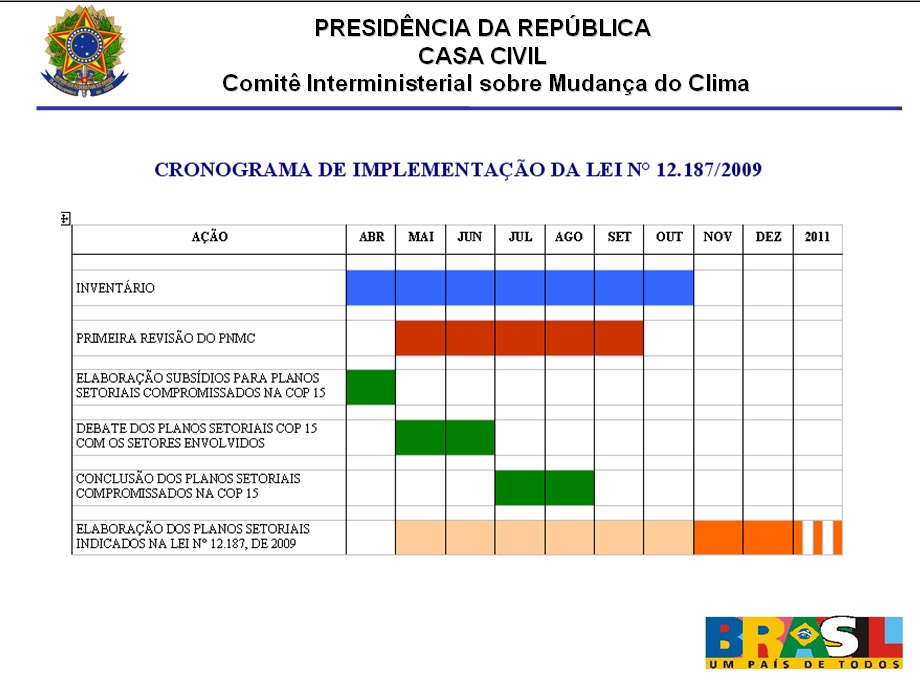Will time allow it?
Posted on 09. Nov, 2010 by Juliana Russar in Brazil
Para ler esse texto em português, clique aqui
In December 2009, shortly after CoP-15, law number 12.187 passed in Congress establishing the National Policy on Climate Change (PNMC) formalizing domestically the commitments that Brazil has taken in Copenhagen. Its article 12 says:
To achieve the objectives of the National Policy on Climate Change, the country will adopt, as a national voluntary commitment, actions to mitigate greenhouse gases emissions, in order to reduce between 36.1% (thirty-six integers and one tenth percent) and 38 9% (thirty-eight integers and nine tenths percent) its projected emissions by 2020.
Sole Paragraph. The projected emissions for 2020 as well as detailing the actions to achieve the objective stated in the caption shall be prepared by decree, based on the second Brazilian Inventory of Anthropogenic Emissions and Removals of Greenhouse Gases not Controlled by Montreal Protocol, to be completed in 2010.
Although the law already exists, it is necessary that the law is regulated through a decree, as the law number 12.114 that created the National Fund on Climate Change, an instrument of the National Policy on Climate Change, was regulated by decree number 7.343 on October 26th.
In May, the Environmentalist Parliamentary Front and the Climate Observatory promoted the seminar “Climate Policy in Brazil” to address precisely this issue, since the government had promised that the regulation would take place through working groups, with the participation of civil society, which would be constituted until March. On that occasion, Johannes Eck, from the Chief of Staff of the Presidency and from the Inter-ministerial Committee on Climate Change (established in late 2007 to prepare proposals of the Policy, Plan and the National Fund on climate), said that from the twelve Sectoral Plans predicted, five would be initially privileged as the basis of the first decree regulating the National Policy on Climate Change because of the mitigation actions presented in Copenhagen. Below, you can see the twelve sectoral plans, especially the first five, and the table presented by the Ministry of Environment before CoP-15 (in Portuguese):
- Plan of Action for the Prevention and Control of Deforestation in the Amazon, coordinated by the Chief of Staff of the Presidency
- Plan of Action for the Prevention and Control of Deforestation in the Cerrado, coordinated by the Ministry of Environment
- Energy, coordinated by the Energy Research Company
- Agriculture, coordinated by the Ministry of Agriculture, Livestock and Supply
- Replacing Deforestation Coal for Planted Forests in Siderurgy coordinated by the Ministry of Development, Industry and Foreign Trade
- Transport
- Manufacturing Industry and Durable Consumer Goods
- Chemical Industry
- Pulp and Paper Industry
- Mining
- Construction Industry
- Health Services

- Source: Ministry of Environment (MMA)
In addition, according to Eck, the regulation of the law would be linked to the completion of the inventory of greenhouse gases emissions, as can be seen in the sole paragraph of article 12 of PNMC quoted above. It turns out that the inventory has been published, as you can check here, however, the National Policy on Climate Change has not yet been regulated. Beside the need for time to calculate the emission reduction goals based on the inventory (in 2009, they were calculated based on estimates), this happens because the decree will only be published just after the establishment of the five sectoral plans and apparently there will be more than one decree. In May, the timeframe for implementation of National Climate Change Plan was as follows (in Portuguese):
That is, these sectoral plans were to be concluded by August. The executive secretary of Brazilian Forum on Climate Change (FBMC) even sent a letter to the Civil House in September, expressing concern “with the effective establishment of Working Groups and the actual participation of interlocutors indicated by FBMC in the construction of Sectoral Plans on Mitigation and Adaptation to Climate Change”, since only the Working Group of the Agricultural Sector Plan has consistently called for the interlocutors of FBMC for their activities, in addition to being registered actions of the Working Group on the Prevention and Control of Deforestation in the Amazon.
At the meeting of the Brazilian Forum on Climate Change with the presence of President Lula (26/10), an executive summary of the plans was presented without details, and on November 5th, one more FBMC meeting was held to address exclusively this subject. Now, FBMC is awaiting the considerations and proposals to the summaries of the Sector Plans until November 16th, which may or may not be incorporated within the plans.
The question remains: will these plans, so far unknown to the majority of stakeholders and Brazilian citizens in general, have consistency and were the subject of extensive public consultation to be presented at CoP-16 (if time allows …) and, most importantly, be executed?
-
http://jrussar.wordpress.com/2010/11/09/sera-que-vai-dar-tempo/ Será que vai dar tempo? « Blog da Juliana Russar
-
http://live.tcktcktck.org/2010/11/sera-que-vai-dar-tempo-2/ Será que vai dar tempo? | live.tcktcktck.org










